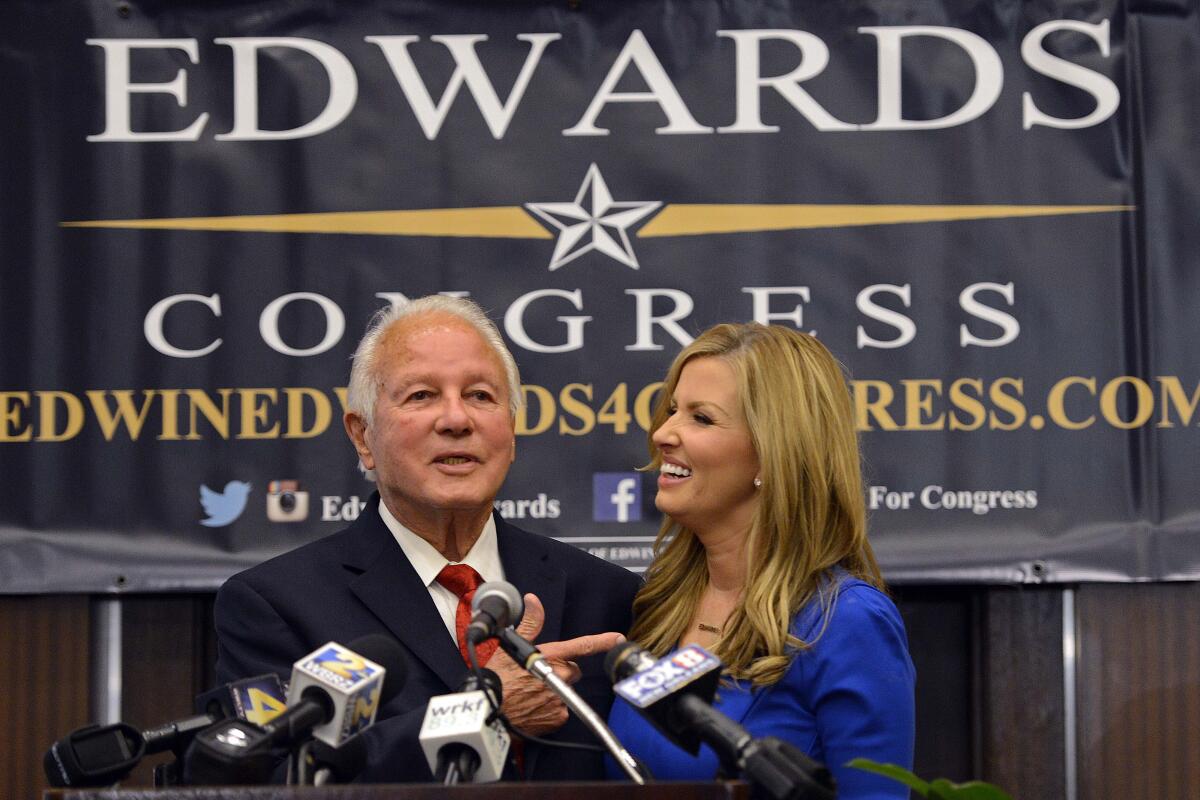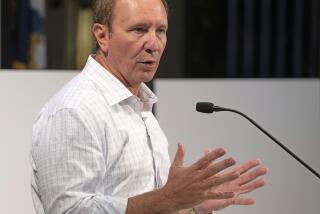Edwin Edwards, flamboyant ex-Louisiana governor who knew power and prison, dies

New Orleans — Edwin Washington Edwards, the high-living, quick-witted four-term governor who reshaped Louisiana’s oil revenues and dominated the state’s politics for decades, a run all but overshadowed by scandal and eight years in federal prison, died Monday at age 93.
Edwards died of respiratory problems with family and friends by his bedside, family spokesman Leo Honeycutt said, days after entering hospice care at his home outside New Orleans.
“I’ve made no bones that I have considered myself on borrowed time for 20 years, and we each know that all this fun has to end at some point,” Edwards said days before he died, according to his family’s statement.
The “Cajun King” was known for delivering a steady supply of memorable one-liners as well as for his deft political instincts. Infamously, the lifelong Democrat said once said that the only way he could lose to a particularly lackluster Republican was if he were “caught in bed with a dead girl or a live boy.”
A native of Louisiana’s Acadiana region who swore his 1972 oath of office in French and English, Edwards enjoyed renewed popularity after emerging from prison in 2011 at age 83 with his flamboyant character intact.
The federal case that led to his May 2000 conviction involved taking payoffs from interests seeking riverboat casino licenses during his final term in the 1990s. Edwards maintained that the case was built on secretly taped and misinterpreted conversations and the lies of his former cronies, who made deals to avoid prison.
But the conviction and the numerous investigations and allegations were an unavoidable stain on his legacy.
“He had eloquence, creativity, a razor-sharp mind, executive abilities that many lacked, and leadership skills that many envied. He could relate to crowds better than almost any politician I ever knew,” Louisiana State University journalism professor Robert Mann said in an email Monday. “He had everything, and yet squandered it by devoting much of his time to enriching his friends. I’ve rarely seen a wider chasm between the promise for greatness and reality.”
Silver-haired and gifted with an easy charm, Edwards dominated Louisiana politics in the late 20th century much as Huey P. Long had dominated its earlier years. They shared a populist appeal to the state’s downtrodden, and political fortunes that flowed in part from taxes on oil, but the deal-making Edwards had a cooler demeanor.
Edwards was born on Aug. 7, 1927, to a sharecropper and a midwife in Avoyelles Parish, a region settled by 18th century French exiles from Nova Scotia who came to be known as Cajuns. According to his authorized biography, his father’s ancestors were Welsh; his mother’s continental French; but Edwards always considered himself a Cajun.
Raised a Roman Catholic, Edwards preached in the Church of the Nazarene as a teen and didn’t drink or smoke. Despite his unabashed fondness for high-stakes gambling, dirty jokes and his reputation as a womanizer, he earned a following among both Catholics and fundamentalists.
He had four children during a 40-year marriage to his high school sweetheart, the former Elaine Schwartzenburg, before they divorced in 1989. Five years later, at 66, he married 29-year-old Candy Picou in a ceremony at the governor’s mansion. They divorced after he went to prison, but he found a third wife in Trina Grimes, then 32, a penpal who visited him behind bars.
They had a son, Eli, in 2013 — Edwards’ fifth child — and starred in a short-lived reality TV show, “The Governor’s Wife.”
A lawyer, Edwards began his political career on the City Council in the town of Crowley in 1954 before moving on to the state Legislature, then Congress. He won the governor’s office in 1972 with help from organized labor and Black voters realizing their civil rights-era strength.
He appointed more Black Americans to policy-making positions than any previous governor and spearheaded the adoption of a new constitution.
“My dad never saw color and never turned his back on anyone in need,” said his son Stephen Edwards, according to the family statement.
Edwards seized on an oil boom in 1974 to defeat energy interests and fill Louisiana’s coffers, tying oil taxes to price, rather than volume. Changing the severance tax from 25 cents a barrel to 12.5% of value made Louisiana the most cash-rich state in the nation at the time while New York City was going bankrupt, said Honeycutt, his official biographer.
Constitutionally barred from a third consecutive term, he left office in 1980 only to return four years later, after easily defeating incumbent David C. Treen, the state’s first Republican governor since Reconstruction and a frequent target of Edwards’ barbs. “It takes him an hour and a half to watch ’60 Minutes’” was typical.
The campaign was briefly suspended by tragedy: Edwards’ youngest brother, attorney Nolan Edwards, was killed by a disgruntled client.
A grieving Edwards resumed the race and went on to win, then paid off his debts from the $14-million campaign by chartering a $10,000-a-head trip to France for his friends and supporters.
“I’ve wanted all my life to be a king, and now I can be,” he quipped during their stop in Versailles.
But more trouble loomed.
Oil prices plummeted. Edwards pushed through $700 million in highly unpopular taxes, and his reputation for impropriety caught up with him.
Edwards had seemed impervious to earlier scandals, but in 1985 he was indicted on federal racketeering charges involving hospital and nursing home regulations. His fortunes had faded by the time he was acquitted the next year: Bowing out of a 1987 runoff when he faced certain defeat against Democratic Rep. Buddy Roemer, Edwards appeared politically finished.
But Roemer suffered political setbacks — voters rejected his tax overhaul package and disliked his switch to the Republican Party. Edwards entered the race and won the runoff in a landslide against former Klansman David Duke by stoking fears that an ex-Nazi in the governor’s mansion would bring economic ruin.
Edwards retired in 1996 before winding up again under federal indictment. After prison, he attempted one more political comeback, losing a runoff to a Republican in a south Louisiana congressional race in 2014.
More to Read
Start your day right
Sign up for Essential California for the L.A. Times biggest news, features and recommendations in your inbox six days a week.
You may occasionally receive promotional content from the Los Angeles Times.







